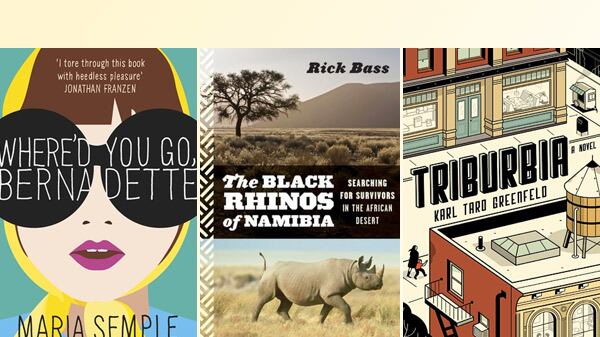Where’d You Go, Bernadette?by Maria Semple
An epistolary novel that manages to blend literary pursuits with gleeful comedy.

The idea of an epistolary novel may bring to mind images of dusty, fate-lamenting lovers clutching quills and tear-stained parchment, but in her new book Where’d You Go, Bernadette, Maria Semple uses e-mail chains, IM chat logs, and FBI records to tell the thoroughly modern story of Bernadette Fox, one-time architectural prodigy who escaped the wilds of Los Angeles into the more treacherous territory of the cut-throat parental politics in the Seattle private school scene. When her 15-year-old daughter, Bee, storming along the track towards the Ivy League, decides that she would like to collect her reward for a perfect report card (straight S’s, for “surpassing excellence,”) in the form of a family trip to Antarctica, Bernadette’s agoraphobia comes up against her willingness to do anything for her daughter, and she disappears. Semple, who formerly wrote for legendary Fox sitcom Arrested Development, has the feel for family strife of a born literary novelist, but she retains the comedic sensibility of a screen writer; which is to say that the book is actually laugh-out-loud funny, rather than “humorous.” And don’t let the hilarity of the first third of the book fool you into thinking that this is a light farce; by the last page, Semple, in addition to skewering helicopter-parents with satire so deft that it could pass for truth, touches on religion, class, and what we owe to those we love.
The Black Rhinos of Namibia: Searching for Survivors in the African Desertby Rick Bass
A prose master goes searching for a poached species in an eternal and unforgiving landscape.

Why is it that the type of mind that creates great writing is so often the same type that yearns to light out for the territories, to abandon safety and comfort in the search for something more real? Do both symptoms perhaps point to the same internal disquiet? In The Black Rhinos of Namibia, decorated writer Rick Bass heads out into the desolate terrain of the Namib Desert, nearly untouched since its creation, to document a persecuted animal that is incredible in its own right, but also, as he shows us, the perfect screen on which to project the darker hearts of man and his talents for self-destruction. Bass writes with the masculine sensitivity of America’s great warrior-poets, but where Hemingway went to consume, or at least to conquer, Bass has gone to understand. There was a time when this type of escape was easy to achieve right here in America, but the margins have been pushed back further than any rugged individualist could have ever imagined, and it’s in this margin that Bass is at home; a timeless place where the most primordial of his emotions can be sky-lit against the horizon. In fact, Bass’s incredible prose seems to obviate any of the terms that might be used to describe this book. Adventure writing, travel writing, and narrative nonfiction all fall short of the experience that he creates. There is adventure here, to be sure, but the pervading whiff of apocalypse points to something more cautionary.
Triburbia: A Novelby Karl Taro Greenfeld
An earnest look at one of New York’s most interesting neighborhoods, told through connected stories.

The whole discussion around the elusive idea of the “hipster” has, at this point, become as tedious as it is incoherent, but the word has now been around long enough to have given way to something more interesting, or even (ugh) ironic: hipster parents. In his first book of fiction, Karl Taro Greenfeld attempts to paint a Winesburg-esque tableau of Tribeca as a neighborhood in flux, where Old New York (which in this case means Giuliani-era New York) is forced to give way to stroller-pushing sound engineers and sculptors, whose creative ventures have actually, as a surprise, lent them enough success to buy, or build, trendy lofts. The book, which is billed as a novel but functions better as a series of vignettes, centers around a group of fathers who go out for breakfast after dropping their kids off at private school. There is a narrative thread, beyond their mere proximity, that ties them all together, but the book’s best moments take place in the characters’ past, when Greenfeld evokes the New York that was. This past was fairly recent, even if the lack of cell phones and social networking will lend it a Precambrian air to readers of a certain age. Greenfeld has elected not to parody the eminently parody-able. Although it’s unclear whether this is a mark of restraint or a missed opportunity, the effect is one of an earnestness that would send any real hipster scurrying back into their artisanal butcher shop.
The Wives: The Women Behind Russia’s Literary Giantsby Alexandra Popoff
The little-told stories of an amazing group of women who put up with and fostered some of the greatest talent in literary history.

If a writer is by definition a temperamental soul, than a Russian writer represents perhaps a most temperamental soul. In The Wives, former Tolstoy biographer Alexandra Popoff delivers the stories of the women tasked with dealing with six of the major Russian writers of the last century and a half: Dostoyevsky, Tolstoy, Mandelstam, Nabakov, Bulgakov, and Solzhenitsyn. The overarching argument that emerges is two-fold. Firstly, that the level of support these women provided their husbands was titanic. Beyond taking dictation, editing, revising, and even typesetting their husbands’ work, they also championed the work as if it were their own. (It took 25 years of struggle for Elena Bulgakov to see her late husband’s masterpiece, The Master and Margarita, finally published.) But the second point is that the work may as well have been their own, such was their creative influence. Popoff aims to elevate our memory of these women from indentured scribes to something more like managing editors, juxtaposed with the more muse-like or even competitive nature of the relationships of their western counterparts, such as Zelda Fitzgerald and Martha Gelhorn. At the book’s beating heart, though, are the love stories, which should make any writer jealous.
The Caller: An Inspector Sejer MysteryBy Karin Fossum
A Nordic crime thriller that deals not with murder but with a series of psychological pranks.

How is it that Norway, a country with just .6 homicides per 100,000 people (compared to America’s five per 100,000) produces so many crime writers? According to the Nordic body of fiction, you can hardly take a step off the fjord without being murdered. However, the crimes that take places in The Caller, Karin Fossum’s latest entry in the long-running Inspector Sejer series, aren’t murders, but rather pranks. The book opens with a sleeping baby covered in blood that’s not its own, and things go from there: a death notice taken out in the paper for an aging but still very much alive woman, a hearse sent to wait outside the home of a man with Lou Gehrig’s disease, etc. This would seem almost unworthy of the dark heart of a Norwegian, but Fossum draws out deeper malice in the ways that the pranks, apparently the lashings-out of an unloved teen, ramify through the lives of those affected. There is something profoundly creepy about the idyllic setting, expressed in great detail, broken up with these moments of pure negativity, almost like a David Lynch film. And perhaps there lies the answer to the Norway question: in a pristine land, crimes stand out more starkly, like blood on snow.





